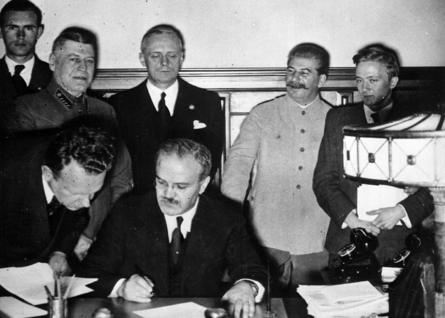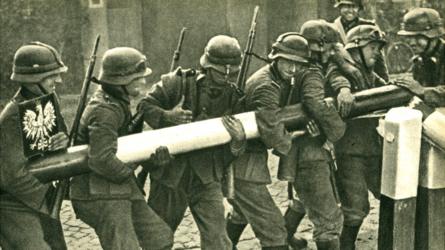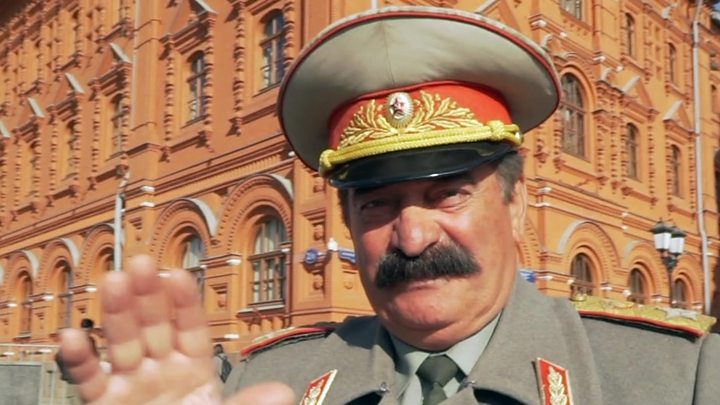Russia-Poland row over start of WW2 escalates
Europe
 Molotov signs the Nazi-Soviet Pact in Moscow, August 1939: Von Ribbentrop (3rd from left) and Stalin (4th, smiling) look on
Molotov signs the Nazi-Soviet Pact in Moscow, August 1939: Von Ribbentrop (3rd from left) and Stalin (4th, smiling) look on
A row between Russia and EU countries over the causes of World War Two has escalated, with a top Russian official condemning the US ambassador to Poland.
Parliament Speaker Vyacheslav Volodin said a tweet by Ambassador Georgette Mosbacher was "insulting" to Russians and Americans.
On Monday she tweeted: "Dear President Putin, Hitler and Stalin colluded to start WWII."
President Vladimir Putin says Poland and its allies are distorting history.
During a marathon news conference on 19 December, the Russian president said it was "totally unacceptable and inaccurate" to cast equal blame on Nazi leader Adolf Hitler and Soviet leader Joseph Stalin for the war's outbreak.
ADVERTISEMENT
Mr Putin said he had requested Soviet archive documents in order to write an article on the subject - Nazi Germany's invasion of Poland on 1 September 1939 - and, in his view, to set the record straight.
He argued that the Western powers and Poland had appeased Hitler's aggression by letting him grab Czechoslovakia in 1938.
Why is Putin angry at Poland?Five states remember victims of WW2 'misery' pact
The Nazi invasion of Poland came just a week after Hitler's Foreign Minister Joachim von Ribbentrop and Soviet Foreign Minister Vyacheslav Molotov had signed a non-aggression pact on 23 August 1939, which stunned the world.
A secret clause in the pact carved up Eastern Europe into Nazi and Soviet spheres of influence, allowing the two dictators - one fascist, the other communist - to occupy and dismantle Poland.
 German troops invaded Poland on 1 September 1939
German troops invaded Poland on 1 September 1939
Ms Mosbacher's tweet recalled that Poland was a victim of the two dictators.
But Mr Volodin, who is close to Mr Putin, said the US state department ought to make sure that an ambassador such as Ms Mosbacher had sufficient knowledge of a country's history before sending her to work there.
Poland still counts losses from WW2 invasionWhy Russia is still fighting world's biggest tank battle
Mr Putin has revived wartime Soviet symbols, and portraits of Stalin are commonly displayed in Russia now.
In 2020, the 75th anniversary of the Allies' victory over Nazi Germany will be marked.

What do Russians think of Stalin?
More than 20 million Soviet citizens died in what Russians call the "Great Patriotic War" after the Nazis invaded the USSR in 1941. Mr Putin's father served in Stalin's NKVD secret police and was severely wounded in the war in 1942.
President Putin argued that Stalin had tried to forge an anti-Hitler alliance with Britain, France and Poland, but that the Munich Agreement in 1938 - dooming Czechoslovakia - had scuppered that plan. Stalin then had to reach a deal with Hitler, feeling betrayed by the West, he argued.
However, Western historians point out that the Nazi-Soviet Non-Aggression Pact meant Hitler did not have to fear a clash with the USSR if he invaded Poland, so giving him the assurance he needed.
Moreover, Stalin then supplied the Nazi war machine with raw materials, which helped fuel - literally - Hitler's aggression against Western Europe.
How has this row escalated?
Monday, 30 December: Besides the tweet by the US ambassador, Germany's ambassador to Poland - Rolf Nikel - also wades into the row, tweeting: "The Molotov-Ribbentrop Pact served to prepare the criminal invasion of Nazi Germany against Poland. The USSR together with Germany participated in this brutal division of Poland."
29 December: Polish Prime Minister Mateusz Morawiecki issues a statement accusing Mr Putin of using the World War Two issue as a means to cover up recent international setbacks for Russia, such as the sports sanctions imposed over Russian doping. Mr Morawiecki says "President Putin has lied about Poland on numerous occasions".
27 December: Poland's foreign ministry summons the Russian ambassador to protest, recalling that the war began with the Nazi-Soviet pact, and that Poland lost about six million citizens in the war. Earlier, Mr Putin had scorned Poland and Western powers for appeasing Hitler and had labelled Poland's ambassador to Berlin in the 1930s an "anti-Semitic swine".
19 September: A European Parliament resxolution - politically significant, but not a law - urges EU states to "make a clear and principled assessment of the crimes and acts of aggression perpetrated by the totalitarian communist regimes and the Nazi regime". It describes the war as "an immediate result" of the infamous Nazi-Soviet deal in 1939.









Post a Comment